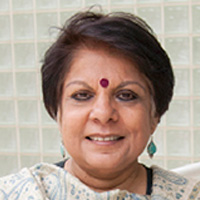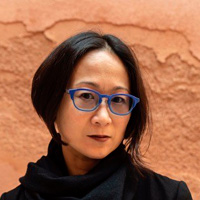Public keynotes
The TRAM project presents two internationally acclaimed scholars in transcultural interactions and global art history. The talks will include questions about cultural colonization or appropriation, of emic and etic concepts and practices. They will discuss what it means to do global art history when it is on fire. The keynote presentations are open to all – no registration is needed.
Place: South Campus, Auditorium 22.0.11
 Monica Juneja
Monica Juneja
What, when, where was art? Tracking the routes of a transcultural concept
Today we witness an endless proliferation of cultural productions that have come to be called art. The expanding limits of the term go hand in hand with its global uses in seemingly similar ways. Contemporary practices of collecting, curating, displaying, and writing which proliferate across continents through biennials, art journalism, and the art market have facilitated a ubiquitous usage of a single notion in a plurality of cultural contexts – raising predictable questions about cultural colonization or appropriation, about emic and etic concepts and practices. Can the same term be applied to societies across time and space, many of whom might not have had a word to spell out what we today understand as art? My lecture addresses these issues by looking at the concept of Art (with a capital “A”) as a way of categorizing and making knowledge. The right to define something as “art” was reserved to selected authorities that laid down the criteria for entry into this privileged domain. Tracking the transcultural trajectories of art as it travelled to contexts away from Europe asks that we attend to those processes by which a concept disconnects from its original moorings while taking roots in new linguistic and cultural settings. As new configurations reactivate and remediate existing understandings, they can equally engender frictions within a single locality. Transculturation as a theoretical frame, I show, opens the way to studying a concept not confined to a single location. It enables us to pluralize temporalities, and to account for resignifications as well as conflicts.
Keywords: art, transculturation, conceptual history, teleology, resignification
Biography
Monica Juneja is a Senior Professor of Art History at the University of Heidelberg, and a Distinguished Professor of the Arts and Humanities at Shiv Nadar University, India. She has written extensively on transculturation and visual representation, the disciplinary practices of art history in South Asia, the history of visuality in early modern South Asia, and heritage and architectural histories from a transcultural perspective.
Her latest book Can Art History be Made Global? Meditations from the Periphery (De Gruyter, 2023), received the Opus Magnum award from the Volkswagen Foundation. She also received the prestigious Meyer-Struckmann Prize for excellence in the Humanities and Social Sciences, and the 2024 Distinguished Teaching of Art History Award of the CAA.
Monica Juneja edits the Series Visual and Media Histories (Routledge), is on the editorial boards of Ding, Materialität, Geschichte (E.J. Brill), Ästhetische Praxis (E.J. Brill), History of Humanities (University of Chicago Press), Journal of Architecture (Taylor & Francis) and co-editor of Journal of Transcultural Studies. She is a member of the Advisory Board of the Walter-Benjamin-Kolleg at the University of Bern, the Tate-Hyundai Research Centre, London, and the Deutsches Zentrum für Kulturgutverluste that supports provenance research of objects acquired in colonial contexts.

Ming Tiampo
Worlding Public Cultures: Reimagining Forms For a World in Crisis
What does it mean to do global art history when the world is on fire?
This lecture reflects upon the four-year project Worlding Public Cultures, which brought together anthropologists, art historians, artists, curators and digital humanists from five cities (Amsterdam, Heidelberg, London, Montreal, and Ottawa) to think critically and collaboratively about the global from multiple perspectives. Over the course of the project, the planet went through profound shifts—a global pandemic, a global racial reckoning, a global resurgence of ethno- and xenophobic nationalisms, wars of liberation and wars of aggression. This combination of interdisciplinarity and crisis on a global scale shifted the stakes of the project from being a largely disciplinary inquiry to one that embraces the project of worlding as a practice of making worlds, not just mapping them.
Departing from Martin Heidegger’s use of worlding to theorize the work of art as constitutive of worlds (Heidegger, 1950), this lecture takes seriously Gayatri Chakravorty Spivak’s postcolonial critique of worlding as a potential force of conquest, decimating Indigenous life worlds (Spivak, 1985). More generative, however, is Pheng Cheah’s interpretation of worlding as a normative force, imagining what “ought to be,” and opening the possibility of literature (but also art) functioning as “an active power in the making of worlds” understood in his work against the frameworks of global capitalism (Cheah, 2016). Bringing together Spivak’s critique with Cheah’s cautiously hopeful constructivism, this lecture argues for art and art historical practice that makes worlds through a constant process of deworlding and reworlding.
In short, this lecture proposes that global art history needs to be more ambitious, thinking not just about what and how to include in our narratives and canons, but fundamentally rethinking the methods, objects, and aims of global art history. In this context, making is interrogated as more than just an artistic practice, and forms as more than visual expression. In worlding beyond Western epistemologies, this lecture posits the possibility of pluriversal worldings that make art, make objects, make music, poetry, movement; make alliances, solidarities, friends; make amends, reparations; make histories, archives, exhibitions, pedagogical platforms, public discourse… and make more just and equitable worlds.
Keywords: worlding, pluriversal, publics, crisis, justice
Biograghy
Ming Tiampo is Professor of Art History and co-director of the Centre for Transnational Cultural Analysis at Carleton University. She is interested in transnational and transcultural models and histories that provide new structures for critically reimagining global narratives. Tiampo’s book Gutai: Decentering Modernism (University of Chicago Press, 2011) received an honourable mention for the Robert Motherwell Book Award. In 2013, she was co-curator of the AICA award-winning Gutai: Splendid Playground at the Guggenheim Museum in NY, and co-edited Art and War in Japan and its Empire: 1931-1960 (Brill Academic Press). Her latest book, Jin-me Yoon, was published by the Art Canada Institute in 2023. Her current book projects include Mobile Subjects: Contrapuntal Modernisms, a monograph and digital humanities project that examines post-imperial histories of migration with an emphasis on artists from Asia, Africa, and Latin America from the former French and British Empires, as well as Intersecting Modernisms, a co-edited sourcebook on global modernisms. Her research collaborations include Asia Forum, the Canadian BIPOC Artists Rolodex, and Worlding Public Cultures, for which she is the co-lead. Tiampo serves on the boards of ICI Berlin, the Hyundai Tate Research Centre: Transnational, and the Paul Mellon Centre for Studies in British Art.
